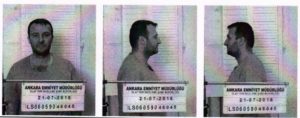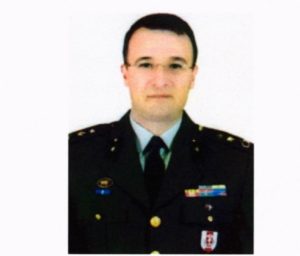Turkish police tortured a lieutenant colonel who worked for military intelligence nearly to death in order to force him to sign a false statement in support of the government storyline on a 2016 false flag coup bid, court testimony has revealed.
Appearing for the first time in court after one-and-a-half years in pretrial detention, Lt. Col. Gökhan Eski decided to describe in detail the terrible ordeal he had gone through while in police custody and jail. His interrogators brutally tortured him so that he would agree to sign a prepared statement dictated by the police and name unsuspecting people as conspirators in the coup attempt.
Eski, now 46, had finished his fourth year as the headquarters security officer (Karargah Emniyet Subayı) at the General Staff command center on the night of July 15. As an officer who knew the compound inside and out, he helped many soldiers who got caught up in the chaotic events to safety. He repeatedly called the police for help but was told to stay put.
Screenshots of messages exchanged between him and his wife on that night were submitted to the court by the defense, clearly portraying a man who was thinking about the safety of others rather than his own. He told his wife he could not leave the soldiers stranded in various sections of the headquarters when his wife pleaded with him to come home. He thought the headquarters had come under a terrorist attack that had prompted the mobilization of the special forces.
In the early morning hours he realized something was not right and did his best to keep himself and others at the command post safe, following standard protocols to ensure the safety of General Staff headquarters. He managed to keep the surveillance records intact so they could be used in a post-incident investigation.
Yet, as soon as the police arrived, he was taken to the courtyard and beaten on the spot. No questions were asked, and no effort was made by the police to determine whether he was suspected of any crime. He was forced to lie down on a hot road under the sun, causing him to sustain severe burns to many parts of his body.
The beatings continued on the bus that was brought to take him and others to the police building where he was confined to a sports hall along with some 800 people, all stripped down to their underwear. He was denied access to a lawyer, and his family was not notified of his whereabouts.

Eski’s injuries were so severe that the police had to take him to the hospital for treatment, which turned out to be another nightmare for him. His hospital stay was cut short amid calls for his lynching by a mob apparently tipped off by the police, and he had to be taken back to the detention site for a new round of torture.
He declined to tell everything he had gone through, apparently due to the trauma he had suffered. But the part he managed to relate was enough to get a picture of what kind of hell he endured in custody, with a total disregard for due process.
“Days later, the police brought me into a room where hot water was poured on the burned parts of my body, various abuses were performed with a baton, my mouth was covered with a cloth, I thought I was drowning, I thought I was going to die in that room, Your Honor,” Eski said when he took the stand at the Ankara 17th High Criminal Court on December 6, 2017. The waterboarding broke his resistance and forced him to agree to whatever the police asked him to say in his statement.
“I accepted everything, everything the police told me to memorize, every suggestion, just to get out of that room. They only removed me from that room on the condition that I admit I was a Gülenist,” Eski added.
In an open court session with his lawyer beside him, Eski explained that he had nothing to do with the Gülen movement, a group that is critical of President Recep Tayyip Erdoğan and opposed to his policies. No evidence was presented to the court by the prosecutor that suggested he was actually associated with the group.
But his police statement from a year earlier had reflected the official government narrative that US-based Turkish Muslim scholar Fethullah Gülen and his group were behind the putschist attempt. Gülen repeatedly denied having any role in the attempt, and the Erdoğan government has failed to present any evidence linking him to the coup. Gülen also called for an international probe, but the Erdoğan government declined the suggestion.
The police, under orders from the government, were determined to build a false case with statements that were forced on victims like Eski under torture and abuse. The police even added details to his statement to make juicy headlines in tabloid newspapers. For example, he was forced to say that his marriage to his first wife was not approved of by the Gülenist network and that he was instead shown some 30 candidates from whom to choose.

“That was all a lie, but I had to go along with it,” Eski said in his testimony. In 2010 he got divorced from his wife, a foreigner whom he had dated for some time before getting married. “She is not a Gülenist, either, and perhaps she’s the one who hates me the most now,” he added, saying he was engaged to another woman.
The facts and truth didn’t matter to the police. He was asked to memorize the code names of some people to cast a bit of mystery on the statement and forced to say he knew all of them as Gülenists. None of the names the police put in the statement were real, which made it impossible to identify any of them. He went along with it for fear of his life.
It didn’t end there. The police had more of a part for Eski to play in this scheme. He was forced to agree to a script saying he had planted a listening device in the Office of the Chief of General Staff at headquarters.
“They mentioned a radio device that I had never seen before, Your Honor. I was told that the office of the chief of general staff was eavesdropped on with this device. I have no authority, no ability to enter the commander’s office. The key to his door is not a normal key. It’s a special key, and there’s a 24-hour guard at the door. It’s monitored 24 hours a day and has a fingerprint door lock [to gain access]. It is an office where electronic scanning [for bugs] is regularly done by various teams. There was no possibility of me entering or operating in that room,” he explained.
Yet he had no choice but to go along with the script to escape further beatings and abuse at the hands of the police. He was asked about this listening device under cross-examination and explained that he actually did not see the radio device but was told to admit to it under duress.
“When I was in this room at the police station, they made me sign papers. I didn’t know what was written on them. … I was told that if I agreed to what they said, I’d be released. I thought I was going to die there, and I accepted everything that was said. If they had told me that I shot down the Russian plane in Syria [referring to the downing of a Russian fighter jet in 2015 by a Turkish combat pilot], I would have said yes without hesitation just to get out of there,” Eski recalled.
The medical report issued by Ankara Gazi Mustafa Kemal State Hospital on July 17, 2016 shows that the burn marks on his body were recorded by a doctor, a rare occurrence since most doctors hesitated to document torture and abuse, fearing their own imprisonment.
On July 20, 2016 the police took him to the prosecutor’s office to give a deposition and warned him to stick to the story or face another round of torture. Prosecutor Ali Alper Saylan did not seem to be interested in what he would have said, anyway. He was told by the police to keep quiet during the deposition, and he had no access to an attorney during the session.
“I didn’t dare tell the prosecutor what I was going through when the police said we’d go back to the police station after the visit to the prosecutor’s office. I did not have a chance to review the statement there, but I had to sign it,” Eski added.
Saylan later leaked the fabricated statement to the government media although the investigation was supposed to be confidential until the filing of an indictment. Eski’s picture was plastered all over the front pages of pro-government dailies, and he was slandered with all kinds of false accusations.
He was supposed to be referred to court for arraignment after the deposition; yet the police took him back to the station, where he was threatened with harm to his loved ones if he decided to tell what really happened in custody. He was told that he had already signed the statements and that there was no turning back from that, anyway. The police made clear that they could get to him even in prison if he had a change of heart about his statement. He was forced to watch video recordings that showed police torturing and abusing top generals in custody and warned that he would go through the same ordeal if he did not behave.
The next day the judge formally arrested him and sent him to jail, where he thought he would be free of the police abuse. But the next night the guards took him out of his cell amid beatings and brought him to the gate, where police officers were waiting for him. “I thought they were going to take me away, believe me, I was so scared. They said they forgot to get me to sign some papers. … I didn’t see exactly what I was signing. … They told me again that there was no salvation in prison, that they could reach me any way, anywhere and any time,” Eski told the panel of judges.
He spent months in jail trying to recover from the torture and abuse and had to go to the hospital some 20 times for treatment.
Ten days before the trial was due to start, on May 22, 2017, he was told by guards at Kırıkkale Prison that the police had come to visit him. He refused to see them, but the guards said he had no choice, He asked for a lawyer to be present while meeting with the police, but that was denied as well. He had to talk to the police in the prison library when no one was around. He was asked to sign a new statement in which some of the code names were now written with full and real names. He did not know any of them. When he refused, he was threatened with torture at the police station. He agreed to sign it.
On May 17, a plainclothes police officer came to visit him and told him he would take him to Ankara, an hour and a half away by car. He refused, and the policeman left. The next day an urgent order was issued for his transfer to Sincan Prison in Ankara. On May 19, an official holiday in Turkey and only three days from from the start of his trial, the police took him out of Sincan Prison and brought him to a police station. The police wanted to make sure that Eski would stick to the story and not talk about the torture. He was taken for a ride, which made him think they would kill him in some remote place and dump his body. He had to sign new papers before he was taken back to Sincan.
“Your Honor, I didn’t get over the psychological and physical pressure and trauma for a long time, I can’t say that I’m totally over that even today. I decided to keep quiet until the court proceedings because I was worried that something would happen to me,” Eski said, adding that he wanted to recant all the previous statements that were forced on him by the police.
As the security officer at General Staff headquarters, he had a team of seven civilian employees, two of them electronics technicians. His main job was to oversee the operation of personnel electronic key cards that were used by the staff to enter the headquarters through some 20 secure gates. He was authorized to enter the clearance credentials issued by the personnel department into the computer system. His job also required him to ensure the smooth operation of security cameras inside and outside the compound and run maintenance and schedule repairs when needed.
When he saw security flaws at the headquarters, he was obliged to report them the garrison commander, who was responsible for the security of the General Staff headquarters, with troops deployed there under his command.
On the morning of July 15, Eski went to his office with an overnight bag because he was planning to leave the city after the close of business. In the afternoon he met with his close friend, Lt. Col. Tolga Kılıçarslan, who was commander of the Guard Battalion. The two went over a recent intelligence alert about suicide bombing plots against military installations.
The Turkish military was already on edge in the months leading up to the coup attempt because of a series of bombings in the Turkish capital. The first attack, blamed on the Islamic State in Iraq and Syria (ISIS), took place on October 10, 2015 near the Ankara train station and killed 109 people. The second attack, attributed to the Kurdistan Freedom Hawks (TAK), an offshoot of the outlawed Kurdistan Workers’ Party (PKK), was launched on military busses in the area of the General Staff and Land Forces Command headquarters in Ankara on February 17, 2016, killing 29, including many military personnel. The third attack near Ankara’s Güvenpark on March 13, 2016 was claimed by the PKK and led to the death of 37 people.
The military was ordered to mobilize resources to prevent any new attacks, and the intelligence notes on possible terrorist attacks and targets that were sent by the National Intelligence Organization (MIT) prompted the military to develop contingencies and rapid response teams. The officers and troops who acted on July 15 under orders thought they were mobilized as part of these contingencies that had been earlier drawn up.
In the evening hours Eski was told about an immediate security alert and saw guards taking up arms and positions to beef up security around the headquarters. The special forces were deployed. The headquarters was prepared for a terrorist act and had run drills under the name of “Hammer” before. Eski said he gave the order to execute the Hammer code, dim the lights, block the entrances and prohibit all personal from exiting the headquarters.
In the early morning hours of July 16, Eski noticed that something was not right and tried to get the troops at the General Staff to safety as he knew the layout of the compound better than anybody else. He was not involved in any putschist attempt and did not kill anybody.
Yet he was made a scapegoat and ordered on June 20, 2019 to serve 11 life sentences at the end of a sham trial during which Eski and his lawyer were deprived of the ability to mount an effective defense, with the judges rejecting most of their motions.
By: Abdullah Bozkurt
Source: Nordic Monitor



